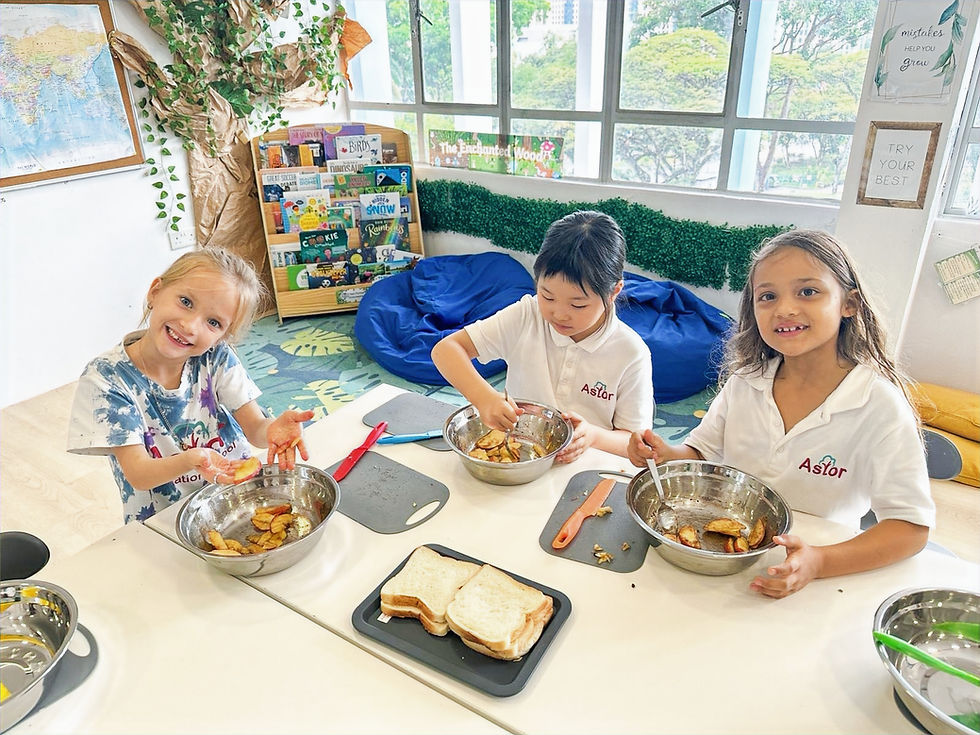Cultivating Skills and Confidence Through Culinary Exploration
- Rachel Vassanthan

- May 24, 2024
- 2 min read
In recent years, there has been a growing trend of children engaging in culinary activities. Astor’s version of that is the Kids Kitchen Enrichment Class. This hands-on approach to cooking not only provides children with practical culinary skills but also offers a multitude of developmental benefits that extend far beyond the kitchen.

Kids Kitchen programs typically involve children in various age-appropriate cooking activities, ranging from simple recipes like fruit salads and sandwiches to more complex dishes like pastries or pizza. Under the guidance of a teacher, children learn basic cooking techniques, kitchen safety, and nutrition principles in a fun and interactive environment.
One of the primary benefits of Kids Kitchen is the development of essential life skills. By participating in cooking activities, children learn how to follow instructions, measure ingredients, chop and dice, and work collaboratively. These practical skills not only enhance their confidence in the kitchen but also transfer to other areas of their lives, such as problem-solving, time management, and teamwork.
Moreover, Kids Kitchen fosters creativity and experimentation. Children are encouraged to explore different flavours, textures, and ingredients, allowing them to develop their palate and culinary preferences. Through trial and error, they learn to adapt recipes, improvise with available ingredients, and innovate new dishes, fostering a sense of creativity and resourcefulness. For example, substituting a burger bun with lettuce to make a healthier version of sliders is an example of how at Astor, we cater to students with gluten allergies. Through this, students learn that there are so many alternatives and substitute ingredients for the dishes, and they can match their needs and taste buds.

Additionally, Kids Kitchen promotes healthy eating habits and nutritional awareness. By engaging children in the cooking process, they gain a better understanding of where their food comes from and the importance of making nutritious choices. They learn to appreciate fresh, whole foods and develop the skills to prepare balanced meals that nourish their bodies.
Furthermore, Kids Kitchen provides valuable opportunities for sensory exploration and fine motor development. Children engage their senses of sight, smell, taste, and touch as they interact with various ingredients and textures. Activities like chopping vegetables, kneading dough, and presentation of food also help refine their fine motor skills and hand-eye coordination.

Beyond the practical skills and developmental benefits, Kids Kitchen fosters social and emotional growth. Cooking together encourages communication, cooperation, and empathy as children work together to achieve a common goal. Sharing meals they've prepared with family promotes a sense of pride and accomplishment, boosting self-esteem and social connections.
Moreover, cooking can be a therapeutic and stress-relieving activity for children here at Astor International School. The motions of stirring, kneading, and rolling dough can have a calming effect, providing children with an outlet for self-expression and creativity. Additionally, the sense of accomplishment they feel after successfully preparing a meal can boost their confidence.
In conclusion, Kids Kitchen offers a wealth of benefits for children, from practical life skills to social and emotional development. By engaging in hands-on culinary activities, children not only learn how to cook nutritious meals but also develop creativity, confidence, and a lifelong appreciation for good food. As we continue to encourage children to explore the joys of cooking at Astor, we also nurture their curiosity and empower them to become confident, capable junior chefs!














Comments